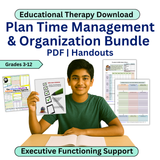Planning, Time Management & Organization | Strategies | Handouts
Latest Update: Now Better Than Ever!
I’m excited to announce that Planning, Time Management, and Organization for Success has just received a major upgrade!
This powerful executive functioning resource now includes seamless integration with my Ultimate, Mindful, and Editable Planner/Agenda—a fully customizable PowerPoint designed to help students manage their time with intention.
New to this edition:
- 🌐 Internet Homework Resources – A curated list of reliable online tools to support learning and assignment completion.
- 💻 Assistive Technology Checklist – A guide to key tech tools that enhance organization, focus, and academic performance.
About the Bundle
Empower your learners with this 179-page digital toolkit, designed to strengthen executive functioning skills across grade levels—from elementary through college.
Inside, you'll find a wide range of strategies and printable resources that support:
- 📅 Assignment planning and time management
- 🗂️ Personalized organizational systems
- 🧠 Study and memory techniques for long-term retention
- 📝 Test preparation and large project breakdowns
- ✅ Behavior tracking and habit-building
- 📓 Customizable calendars and to-do lists
- 📖 Active reading, writing, and math strategies
- 💬 Goal setting, motivation, and mindful learning habits
An exclusive feature of this bundle is "The Ultimate, Mindful, and Editable Planner/Agenda", a fully editable PowerPoint designed for daily planning, habit tracking, and mindful organization—perfect for students who need structure with a personalized touch.
What Skills Does This Bundle Build?
This all-in-one executive functioning resource supports students in:
- Recording assignments clearly and consistently
- Creating checklists and prioritizing tasks
- Breaking down long-term assignments into manageable steps
- Strengthening writing, reading, and math organization
- Boosting memory, focus, and motivation
- Taking notes efficiently and studying effectively
- Creating mindful and customized agendas
Why Executive Functioning Matters
Executive functions are the brain’s management system, responsible for planning, focus, memory, organization, and self-regulation. While some students develop these skills naturally, many benefit from explicit instruction and concrete tools.
This bundle bridges the gap by offering accessible, step-by-step support to build the skills that underlie academic and life success.
The Three Core Brain Functions Behind Executive Functioning
- Working Memory – Helps students hold and manipulate information in the short term while building connections for long-term memory.
- Inhibitory Control – Supports self-regulation, focus, task initiation, and emotional control.
- Cognitive Flexibility – Allows students to shift perspectives, adapt to changes, and find new problem-solving approaches.
Why Start Now?
Executive functioning skills develop gradually from early childhood through early adulthood (often maturing around age 20–25). Starting early with structured, research-based support sets the stage for lasting academic confidence and independence.
GET FREE SAMPLE PAGES HERE
Help Your Students Thrive
Equip your learners with the tools they need to succeed, academically and beyond, with Planning, Time Management, and Organization for Success.
📥 Download the full bundle here and watch your students develop the clarity, structure, and confidence they need to take charge of their learning.
Each purchase is a single license, for a single teacher, parent, or therapist. If additional individuals wish to use the product, please purchase additional copies. Thank you.













